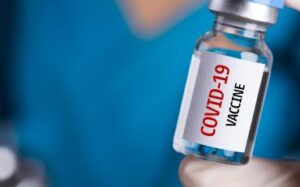
By Krista Hodne, MD
1) HOW DO THE COVID VACCINES WORK?
There are three COVID-19 vaccines currently approved by the FDA to be administered in the United States. The Pfizer-BioNTech vaccine (usually called the “Pfizer vaccine”) and the Moderna vaccine are both mRNA vaccines. They require two doses to be fully effective. The Pfizer vaccine is approved for ages 12 years and older and is given in 2 doses, 3 weeks apart. The Moderna vaccine is approved for ages 18 years and older and is given in 2 doses, 4 weeks apart. The mRNA vaccines teach our cells to make a protein found in the virus causing COVID-19. The presence of that protein in our body triggers an immune response, producing virus fighting cells called T-lymphocytes and B-lymphocytes. These virus fighting cells become active if we are infected or exposed to the coronavirus causing COVID-19. They help to neutralize the virus so that we do not become seriously ill.
The other vaccine currently approved in the United States for people 18 years and older is the Johnson & Johnson / Janssen vaccine. This vaccine requires a single dose. The J&J/Janssen vaccine is a viral vector vaccine. This vaccine uses a modified adenovirus as a vector – basically a container – that carries some genetic material from the virus that causes COVID-19. Once the viral vector is inside our cells the genetic material instructs the cell to make a protein unique to the virus that causes COVID-19. From here the process works the same as in the other vaccines. The protein in turn triggers our immune system to produce virus-fighting T-lymphocytes and B-lymphocytes. These T-cells and B-cells are activated if we are exposed to the virus causing COVID-19, helping to prevent us from becoming infected or seriously ill.
2) WHO SHOULD GET A COVID VACCINE?
Currently the Pfizer-BioNTech vaccine is available for people ages 12 and older. Studies are ongoing to look at efficacy and safety in younger children. The other two vaccines are available for people 18 and older. Everyone who is eligible and able should get the vaccine for their own and others’ protection. If you have a history of an immediate or severe allergic reaction to a COVD-19 vaccine or any of the ingredients in the vaccine you should contact your physician before getting the vaccine.
The vaccines reduce both the risk of contracting COVID 19 and the risk of severe disease if you get COVID-19. Although fewer children have been sick with or died from COVID-19, they can still carry the virus, get sick, and spread the virus to others. A major concern is children who have the virus but are not sick spreading it to people who may be more vulnerable to severe illness. Furthermore, children who do get sick with COVID-19 can suffer complications from COVID-19 infection and be left with long-lasting effects.
3) WHAT ARE THE SIDE EFFECTS OF THE COVID VACCINES?
The COVID-19 vaccines are typically well-tolerated. Most people will not have serious problems after being vaccinated. Common side effects of the COVID-19 vaccines include pain, swelling, or redness on the arm where you go the shot. Other common side effects include fatigue, headache, fever, swollen lymph nodes, muscle pain in other parts of your body, joint pain, and chills. Rare side effects include a serious allergic reaction. A very small number of people who have received the J&J/Janssen vaccine have developed blood clots in the brain, abdomen, and legs. Some have also had low levels of platelets. The chance of one of these problems occurring is very, very small.
COVID vaccines are also offered to women who are pregnant or breastfeeding. You can read more information about pregnancy and COVID vaccine here: https://www.cdc.gov/coronavirus/2019-ncov/vaccines/recommendations/pregnancy.html
4) CAN I STOP WEARING A MASK AFTER I GET THE COVID VACCINE?
Mask guidelines continue to change as our knowledge about COVID-19 and the vaccine grows. Currently the Centers for Disease Control and Prevention (CDC) recommends that you should continue to mask until you have been fully vaccinated. You are fully vaccinated 2 weeks after your second dose of the Pfizer or Moderna vaccines and 2 weeks after the single-dose Johnson & Johnson/ Janssen vaccine. Even when you are fully vaccinated, you should continue to wear a mask if you travel (i.e.: on planes, buses, trains, or other public transportation), if you are sick or have been around someone who is sick, or if you have a health condition which weakens your immune system. Furthermore, you should continue to follow the guidance at your workplace and local businesses.
We still do not know how long COVID-19 vaccines will protect people from disease and how effective they vaccines are against the various variants of the virus. The vaccines may not be as effective against some of these variants thereby increasing our risk of severe illness if exposed to one of them. Masking has been shown to reduce our risk of contracting and spreading the virus that causes COVID-19.
https://www.cdc.gov/coronavirus/2019-ncov/vaccines/fully-vaccinated.html
5) DEBUNKING 5 MYTHS ABOUT THE COVID VACCINE
1) Does the COVID-19 vaccine affect my ability to get pregnant and have a baby? NO. There is no evidence that COVID-19 vaccination causes any problems with pregnancy and there is no evidence that fertility is affected by any vaccine, including the COVID-19 vaccines.
2) Will the COVID-19 vaccine alter my DNA? NO. COVID-19 vaccines do not interact with your DNA at all. The three available vaccines both deliver instructions to our cells to start making infection-fighting cells to protect us against COVID-19. These instructions, however, do not enter the nucleus of the cell where our DNA is kept. Furthermore, our cells break down and gets rid of the genetic instructions from the vaccine soon after it is delivered.
3) Will I test positive for COVID-19 after getting the vaccine? NO. COVID-19 tests detect COVID-19 virus currently in your body. The COVID-19 vaccine does not put any COVID-19 virus in your body. If your body develops an immune response after vaccination, you may test positive on some antibody tests. Antibody tests indicate a previous infection with COVID-19 virus.
4) Can the COVID-19 vaccine make me sick with COVID-19? NO. The current vaccines do not contain any live COVID-19 virus. After the vaccine you may have some side effects including “flu-like symptoms” (fever, chills, headache, and body aches). These symptoms are a sign that your immune system is learning how to recognize and fight the virus that causes COVID-19.
5) If I get the COVID-19 virus vaccine, can I shed any of the vaccine components to others? NO. Individuals who have received the COVID-19 vaccine cannot shed or pass on any of the vaccine components to others.
